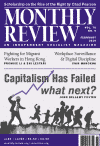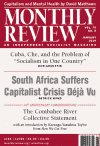2019

Peter D. Carter and Elizabeth Woodworth, Unprecedented Crime: Climate Science Denial and Game Changers for Survival (Atlanta: Clarity Press, 2017), 270 pages, $27.95, paperback.
Unprecedented Crime, a book by Peter Carter and Elizabeth Woodworth, with a foreword by leading climate scientist James Hansen, outlines the criminality of those who actively promote the continuing emission of carbon gases into the atmosphere despite having full knowledge of the consequences. These consequences include the breakdown of large ice sheets, rising sea levels, and the intensification of extreme weather events around the world, such as hurricanes, floods, and fires. | more…

Climatologist James Hansen’s 2018 “Climate Change in a Nutshell: The Gathering Storm,” known as the Nutshell document, is the single most important analysis currently available for general readers seeking to stay abreast of the science and politics of global warming. Nevertheless, denial of the extent of the conflict between capitalism and the climate remains pervasive. Such views were subjected to a strong refutation by Enno Schröder and Servaas Storm in a November 2018 paper entitled “Economic Growth and Carbon Emissions: The Road to ‘Hothouse Earth’ Is Paved With Good Intentions.” | more…

Less than two decades into the twenty-first century, it is evident that capitalism has failed as a social system. The world is mired in economic stagnation, financialization, and the most extreme inequality in human history, accompanied by mass unemployment and underemployment, precariousness, poverty, hunger, wasted output and lives, and what at this point can only be called a planetary ecological “death spiral.” Many of the symptoms of the failure of capitalism are well-known. Nevertheless, they are often attributed not to capitalism as a system, but simply to neoliberalism, viewed as a particular paradigm of capitalist development that can be replaced by another, better one. A critical-historical analysis of neoliberalism is therefore crucial both to grounding our understanding of capitalism today and uncovering the reason why all alternatives to neoliberalism and its capitalist absolutism are closed within the system itself. | more…

From the Gaze of the Supervisor to the Digitalization of Employees
Workplace surveillance and the invasion of employee privacy have always been present under capitalism. Historically, this has mostly involved the combination of visual observation and abstract time, focusing on employee performance. However, the development of new information and communication technologies has brought important changes to the manner in which employers control employee productivity. Such digitalization or datafication of employees constitutes a qualitative change in the history of workplace surveillance—a change that reduces workers, their performance and bodies, to lines of code and flows of data to be scrutinized and manipulated. | more…

Liberal Historians and the Retreat from Class
While the explosion of studies on the rise of the right has undoubtedly enriched our understanding of these powerful forces and individuals, we are due for critical assessments of these studies from the left. Over the past few decades, dismissals of class-based interpretations of history have plagued this type of scholarship. Expressed by some of the profession’s most institutionally privileged members, such dismissals have led to a narrowing of discussions and debates by limiting studies to the tensions between liberals and conservatives and by downplaying or ignoring leftist critiques of liberalism. | more…

Eni Lestari interviewed by Promise Li
The precarious state of migrant workers has become a major area of concern for the contemporary global economy. In Southeast Asian regions in particular, the number of migrant workers has spiked since the 1990s. In the city of Hong Kong, domestic migrant workers, predominantly Filipino and Indonesian women, now make up around a tenth of the total working population. Since the beginning of Southeast Asia’s labor diaspora, activists have been fiercely organizing against the rampant exploitation and abuse of migrant workers. | more…

In this issue we commemorate the fortieth anniversary of the publishing of the definitive version of The Combahee River Collective Statement in Zillah Eisenstein, ed., Capitalist Patriarchy and the Case for Socialist Feminism. We are also extremely pleased to announce Monthly Review Press author Kohei Saito has won the prestigious Deutscher prize for 2018 for his Karl Marx’s Ecosocialism: Capital, Nature, and the Unfinished Critique of Political Economy. There is no doubt that this book constitutes one of the great works of Marxian theory in our time. | more…
Business tycoon Cyril Ramaphosa, who, according to Forbes, was worth more than $450 million in 2015, has been the president of the ruling African National Congress since December 2017. Despite the change in ruling-party leadership, the residual old-guard politicians from the era of Jacob Zuma’s patrimonial, corrupt regime still retain enormous power. | more…

This reprint of Keeanga-Yamahtta Taylor’s introduction to How We Get Free—Black Feminism and the Combahee River Collective serves as an introduction to both the Combahee River Collective and their seminal statement on black feminism. | more…

The most general statement of our politics at the present time would be that we are actively committed to struggling against racial, sexual, heterosexual, and class oppression and see as our particular task the development of integrated analysis and practice based upon the fact that the major systems of oppression are interlocking. The synthesis of these oppressions creates the conditions of our lives. | more…

The presidential elections in Cuba in March 2018 has raised again the question of the country’s survival. How can Cuba hold up and develop against the economic, cultural, and military encirclement of U.S. imperialism in particular and the capitalist system in general? An answer can be sought in the history of Cuba’s socialist transition, the unique role played by Che Guevara, and the emergence of ideas regarding the possibility (and impossibility) of achieving socialism in one country alone. | more…

The psychoanalytical framework developed by Marxist Erich Fromm strongly challenges the dominant biological and individualistic explanations of the mental-health crisis that is now sweeping the globe. Fromm emphasized that all humans have certain needs that must be fulfilled in order to ensure optimal mental health. It follows that capitalism is crucial to determining the experience and prevalence of mental well-being, as its operations are incompatible with true human need. | more…










